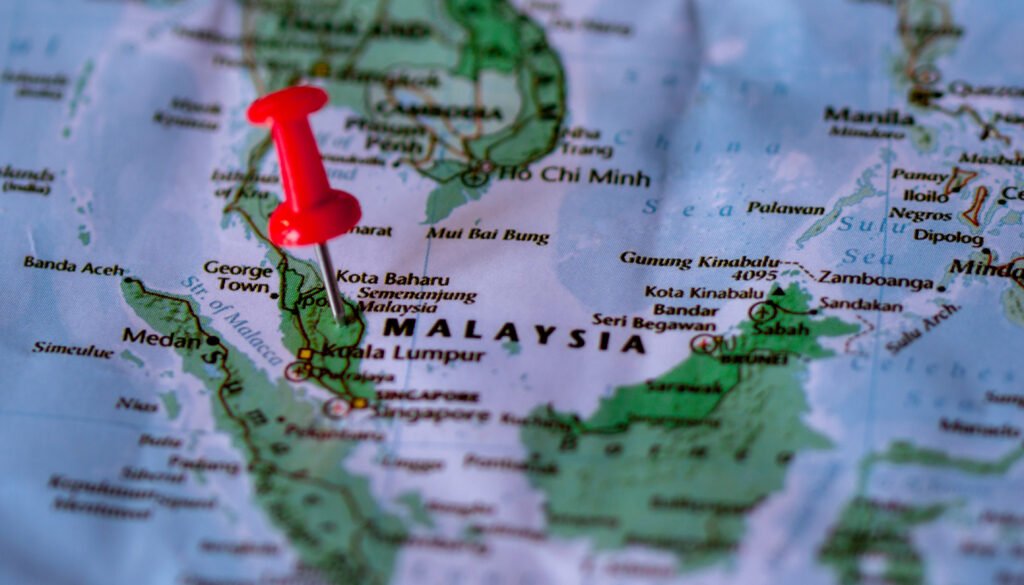Malaysia’s Ministry of Economy on July 27, 2023, has announced Part 1 of the National Energy Transition Roadmap (NETR), a roadmap aimed to accelerate the country’s energy transition. Part 1 of NETR outlines 10 flagship catalyst projects and initiatives based on six energy transition levers: energy efficiency; renewable energy; hydrogen; bioenergy; green mobility; and carbon capture, utilization and storage (CCUS). These implementations are expected to generate reduction in GHG emission of more than 10,000 GgCO2 equivalent per year, along with RM25 billion in total investment and 23,000 job opportunities. Part 2 of NETR, which outlines the supporting provisions for these projects, are projected to be released few weeks after Part 1.
Below are the identified 10 flagship catalyst projects and initiatives and implementation modalities.
| Energy Transition Levers | Flagship | Target | Authority |
|---|---|---|---|
| Energy Efficiency | Efficient Switch | Energy Efficiency and Conservation Act (EECA)
The bill to regulate energy intensive uses will be tabled in Parliament in the 4th quarter of 2023. |
Ministry of Natural Resources and Climate Change (NRECC) |
| Energy Audit for Rail Sector
Railway operators to perform energy audit for energy savings and lowering costs. |
Ministry of Transport (MOT) | ||
| Renewable Energy | Renewable Energy Zone (RE Zone) | Integrated RE Zone
A large scale integrated sustainable development spanning the entire supply chain will be created, along with a pilot RE Zone. |
Khazanah Nasional Berhad (sovereign wealth fund of Malaysia) |
| Solar Park
100MW deployment of solar parks across 5 sites in several states. |
TNB (Malaysia’s national electricity company) | ||
| Hybrid Hydro-Floating Solar PV (HHFS)
Development of 2500MW HHFS potential at reservoirs to increase RE generation close to 24-hour availability. |
TNB | ||
| Resident Solar
Construction of 4.5MW solar capacity across 450 homes in Elmina and Bandar Bukit Raja in Selangor. |
Sime Darby Property | ||
| Energy Storage | Energy Storage System (ESS)
Development of utility scale ESS to enable higher penetration of variable RE. |
NRECC and Energy Commission | |
| Energy Secure | Sabah Energy Security Initiative
Development of solar and hydropower plants, formulation of policy on biowaste, and feasibility of geothermal for power generation. |
Energy Commission of Sabah (ECoS) | |
| Hydrogen | Green Hydrogen | Sarawak Hydrogen Hub
Development of 3 green hydrogen plants by 2027 for domestic and export uses in Sarawak. |
SEDC Energy |
| Hydrogen for Power | Co-firing of Hydrogen and Ammonia
Co-firing of Hydrogen and Ammonia to decarbonize TNB generation plants. |
TNB | |
| Bioenergy | Biomass Demand Creation | Biomass Clustering
Development of biomass clusters with a centralized plant using aggregated feedstock from multiple nearby mills. |
NRECC and the Sustainable Energy Development Authority (SEDA) |
| Biomass Co-firing
Co-firing initiative at the existing 2100MW Tanjung Bin power plant. |
Malakoff | ||
| Green Mobility | Future Mobility | EV Charging Stations
Installation of 10,000 EV charging stations by 2025 along highways and at selected commercial buildings. |
Ministry of Investment, Trade and Industry (MITI) |
| Mobile Hydrogen Refuelling Station
Introduction of first mobile hydrogen refuelling station for transportation in Peninsular Malaysia. |
Ministry of Science, Technology and Innovation (MOSTI) | ||
| Public Transport Electrification
Electrification of first and last mile public transport and upgrading infrastructure, with maintenance, repair and overhaul opportunities for local small and micro enterprises. |
MOT and Prasarana | ||
| Solar Photovoltaic (PV) Installation for Rail Operations
Installation of PV systems in rail operations such as stations and depots. |
MOT | ||
| Future Fuel | Biofuels Hub
Development of bio-refinery in Pengerang, Johor as a creating hub to produce bio-based products such as sustainable aviation fuel and hydrotreated vegetable oil. |
PETRONAS (National Oil Company) | |
| CCUS | Carbon Capture and Storage (CCS) for Industry | Regulatory Framework
Development of policy and regulatory framework to facilitate the implementation of CCUS projects, including transboundary carbon movement. |
Ministry of Economy |
| Kawasari (Johor) and Lang Lebah (Sarawak) CCS
Implementation of CCS catalyst projects at two high CO2 gas fields mentioned above, by 2026 and 2028 respectively. |
PETRONAS |
Alongside this roadmap, the Malaysian government has also pledged net zero greenhouse gas emissions by 2050, which proceeded by raising of renewable energy capacity to 70% by 2050, as well as enabling cross-border trade of renewable energy that was once banned.
Download this roadmap from URL below:
https://www.st.gov.my/en/contents/files/download/188/NETR_S3.pdf
 Malaysia Announces Part 1 of National Energy Transition Roadmap
Malaysia Announces Part 1 of National Energy Transition Roadmap 

























